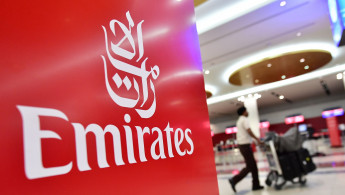Yemen government officials join calls for Emirates airline boycott
Senior Yemeni officials have joined activists in calling for a boycott of UAE products and airlines over their involvement in Yemen’s devastating war.
The calls came following the UAE's recent airstrikes against Yemeni government forces in Aden and support for southern separatists.
The UAE are part of the Saudi-led coalition that supports President Abdrabbuh Mansur Hadi's government against Houthi rebels. Abu Dhabi has been widely condemned for supporting southern militias that are at war with Yemeni government forces in Aden and other cities, including members of Hadi's administration.
Mukhtar al-Rahbi, the advisor to Yemen's minister of information tweeted: "Boycotting the products of the UAE after the crimes of the UAE against the Yemeni people and the Yemeni army and supporting an armed rebellion of the transitional racist coup militia."
|
مقاطعة منتجات الإمارات بعد جرائم الإمارات بحق الشعب اليمني وبحق الجيش اليمني ودعمها تمرد مسلح لمليشيات الانتقالي الانقلابية العنصرية القروية. pic.twitter.com/Ot9lFUaYqX — مختار الرحبي (@alrahbi5) September 5, 2019 " style="color:#fff;" class="twitter-post-link" target="_blank">Twitter Post
|
Yemenis on social media have also reacted furiously to the UAE-backed attacks on government forces last week, describing Abu Dhabi's actions in Yemen as a "betrayal".
Some have called for a boycott Emirati airlines and products until the UAE ceases its support for southern separatists.
Also read: Yemen government rules out talks with UAE-backed southern separatists
The hashtags #boycott_Emirates_airline and #YemenisDemandKickOutTheUAE have been trending on Twitter, urging travellers not to help finance one of the UAE's best-known brands.
Rights groups and activists accuse the UAE and the Saudi-led military coalition of gross human rights violations in Yemen, including airstrikes on homes, schools and hospitals.
Clashes between UAE-backed separatists and government forces - who for years fought on the same side against the Iran-aligned Houthi rebels - have raised fears that the Yemen could break apart entirely.
This intensified last month when southern separatists took over Aden, which serves as a seat of Yemen's interim government. Clashes between pro-Hadi forces and Abu Dhabi-backed fighters have intensified in recent weeks, with the UAE reportedly striking government soldiers.
The Saudi-led coalition first intervened in Yemen in March 2015 as the Houthi rebels closed in on Aden prompting Hadi to flee into Saudi exile.
The conflict has since killed tens of thousands of people - most of them civilians - and driven millions more to the brink of famine in what the United Nations calls the world's worst humanitarian crisis.





 Follow the Middle East's top stories in English at The New Arab on Google News
Follow the Middle East's top stories in English at The New Arab on Google News
![Israeli forces ordered bombed Gaza's Jabalia, ordering residents to leave [Getty]](/sites/default/files/styles/image_330x185/public/2176418030.jpeg?h=a5f2f23a&itok=_YGZaP1z)

